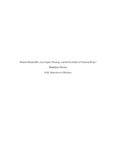Dietrich Bonhoeffer, Apocalyptic Theology, and the Possibility of Christian Ethics

View/
Author
Oliveira, Brooklyne Nicole
Subject
Washington and Lee University -- Honors in Religion
Bonhoeffer, Dietrich, 1906-1945
Christian ethics -- Study and teaching
Theology
Apocalyptic literature
Metadata
Show full item recordDescription
Brooklyne Nicole Oliveira is a member of the Class of 2021 of Washington and Lee University. Thesis; [FULL-TEXT FREELY AVAILABLE ONLINE] If one takes the assertions of Christianity seriously -- that God became incarnate, was crucified, resurrected, and will come again -- then one faces complex questions about
worldly human responsibility and agency. Indeed, God's apocalyptic intervention in history appears to override the possibility of meaningful human responsibility or agency, seemingly eliminating the possibility of Christian ethics. In this paper, I explore this 'problem of Christian ethics,' finding a solution in a reading of the theology of Dietrich Bonhoeffer through the lens of Pauline apocalyptic. I argue that Bonhoeffer restores the viability and integrity of Christian ethics by adopting a thoroughly apocalyptic theology, affirming human responsibility and agency in a world that is ultimately in the hands of a sovereign God. Far from issuing a call to follow an ethical program or a facile imitation of Jesus, Bonhoeffer develops what scholar Philip Ziegler calls a "theological ethics of God's apocalypse," one in which human knowledge, agency, and ethics are radically transformed by the apocalypse of Christ's incarnation,
crucifixion, and resurrection. Brooklyne Oliveira